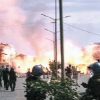Goa is abuzz with excitement as vintage bike and car owners, users, collectors and fans are decking […]

MISSING POLICE IN PAHALGAM: WHO IS RESPONSIBLE FOR THIS BIGGEST BREACH OF PUBLIC SECURITY?By Ajay K. Mehra
In the News, May 17- May 23, 2025 May 16, 2025Security personnel during a search operation at Baisaran area of Pahalgam to nab attackers of the Pahalgam terror attack, in Anantnag district, Jammu and Kashmir, Wednesday, April 23, 2025.
Is it not the responsibility of the Lieutenant Governor and his office to keep the police ready to maintain public security and peace in the state?
The war between India and Pakistan precipitated following a terrorist attack in Baisaran valley in Pahalgam district of Jammu and Kashmir on April 22, 2025, by five militants, apparently from across the Line of Control, killing 26 innocent people, mostly tourists, has mercifully stopped. Although the opaque ceasefire does not clearly tell us anything about the US role in the process of peace, this nonetheless prevents further loss of life on both sides of the border. However, even though the euphoria will continue in the public domain, from the points of view of accountability, responsibility, as well as public security, it leaves several questions unanswered.
First, that five armed terrorists could come unhindered to a tourist spot not easily accessible shows a clear breach of public security but more importantly, accountability and responsibility at different levels of the administrative hierarchy, which no one is owning.Accountability, as we know, is what an official agrees to do and what he/she is supposed to do. In case of Jammu and Kashmir, a state bifurcated (in effect its territory was reduced) in October 2019 and simultaneously demoted to a union territory from being a state; without an elected government, obviously, the Union government, represented by the Lieutenant Governor (LG), assumed the accountability in the realm of public order.
Under the new status and the new arrangements, an election to revive the legislative assembly of J&K was held in September-October 2024. However, this elected government does not have any role in the accountability for public order – this is situated in Lt. Governor, under the directive of the Union Ministry of Home Affairs.
The responsibility, on the other hand, refers to a person’s (or institution’s) task assigned by the higher authority. In this case, it is the Union government that assigns the responsibility. Apparently, in this scenario, the responsibility of the elected government, at the moment headed by chief minister Omar Abdullah, is restricted to several other matters including public security. In fact, according to the definitions we have stated, the two principles of governance are under the strict control of the Union government. Thus, while the chief minister, as an elected representative, has met the survivors from the victims’ families, attempted to do whatever he could do to reach out to the affected families, the LG, who is responsible for public order in the UT of J&K, has kept his mouth shut.
The Union home minister has visited and attempted to soothe the frayed tempers, but the larger questions that face the victims’ families, the people of the UT and the Union government starkly, remain unanswered.
Preventing Terrorism
Terrorism erupted in (united) Jammu and Kashmir on December 8, 1989, with the abduction of Rubaiya Sayeed, a medical doctor and the daughter of then Union home minister, Mufti Mohammad Sayeed. In the bargain for her release, the terrorists in Srinagar demanded the release of five fellow-terrorists kept in the jails of the state. The abduction of the daughter of the Union home minister was a pressure that the Indian government could not take. The six days from that day, when she was released in exchange for the five incarcerated terrorists, set a benchmark for terrorism in the erstwhile state and in India. It emboldened terrorists, who went on to hijack the Indian Airlines flight IC 814 to Kandahar 10 years later.
Several cusecs of water have flown in the Jhelum since then. The political developments in the state have also changed the complexion of political power in three and half decades as well as the Indian state also witnessed several changes at the Raisina Hill since then. The Narendra Modi-led Bharatiya Janata Party government that came to power in 2014 promised a strong Union government. The promise of winning back the trust of the ‘Indian Kashmir’, abrogation of Article 370 and 35A of the Indian Constitution for the complete integration of the state into the Indian Union was promised. The nationalism project was extended to the conquering of Pakistan-occupied Kashmir. Following the repeal of the above mentioned Articles, the state was bifurcated into two union territories – Ladakh being the other one – in 2019.
However, has the promise of a secure J&K, first for the local population and then for the rest of the country for tourism and entrepreneurial activities been fulfilled? Apparently not.
According to the South Asia Terrorism Portal data maintained by the Institute for Conflict Management, terrorist fatalities since 2015 – we give the new government the benefit of doubt for 2014 – are as follows: 115 (2015), 165 (2016), 220 (2017), 271 (2018). A marginal decline in 2019 (163), did not sustain and the trend witnessed an upswing again in 2020 to 232. This data indicates that the terrorist infiltration continued unabated even since 2014, even though the security personnel were able to neutralise many efforts. The fatalities among the security personnel also declined.
However, the terrorist outfits, mostly Pakistan-based but some local cells as well, could inflict a deadly strike at a group of security personnel travelling in vehicles in Pulwama, J&K, on February 14, 2019.
Intelligence failure was mentioned as a factor in this episode. However, it was not clear as to who was overseeing the intelligence units? Which intelligence units, aside from the Intelligence Bureau and Research and Analysis Wing, were entrusted with the task and who do they report to? Does the Army have their own intelligence network? It appears unlikely because they are unlikely to have familiarity with the area and any kind of affinity with the people. However, the most important and the basic unit is the state police.
Have the state police been able to create an effective intelligence unit that operates behind the scenes to supply their own organisation, if not the central security forces?
Where were the police?
Coming back to the basics, we must ask the question: where were the police of the state that functions under the LG? Is it not the responsibility of the LG and his office to keep the police ready to maintain public security and peace in the state?
In a state that is always in danger of terrorist activities either from across the border, or to an extent, the local sleeper cells, the police has to function at the grassroots level to provide protection to not only the local population, but also to the tourists, who are the main source of the state’s economy. Gathering and disseminating information to the concerned agencies for timely action are among the basic functions of the police.
In the case of Baisaran valley, however, the police were absent. Obviously, the terrorists appear to have come from across the LoC, undetected by the military intelligence. If this was the first slip, Pahalgam and its tourist spots along Liddar river, must be under the surveillance of the armed police. The available reports show that there was not even one constable available, let alone a credible number of constabulary under an officer.
In the discourse and the discussions that are on, neither is the LG being quizzed for abdicating his accountability, nor the police establishment for their failure for not fulfilling their responsibility. These questions at both the critical levels of public security must be answered, and the loose ends must be fixed.
The writer is a political scientist. He was Atal Bihari Vajpayee Senior Fellow, Nehru Memorial Museum and Library, New Delhi, 2019-21 and Principal, Shaheed Bhagat Singh Evening College, Delhi University (2018).
Courtesy: The Wire














